From cultural tips to wearing the wrong shoes to avoiding scams, here are 14 of the biggest mistakes I’ve seen people make while visiting Portugal.
Contents
ToggleMistake #1: Thinking the bread is free (the bread is never free)
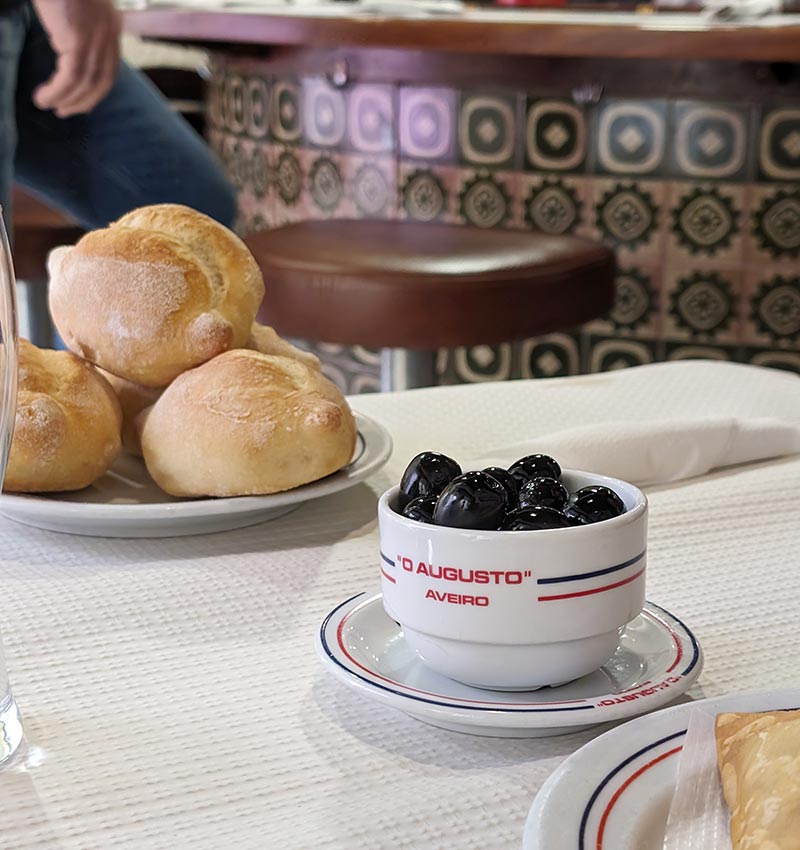
The beauty of travel is connecting with other cultures but sometimes those cultures aren’t what we’re expecting. Restaurants in Portugal have their own unique rules different to other parts of Europe. If I had a euro for every Google review I’ve seen on a restaurant page complaining about being charged for the “snacks that appeared” at the start of the meal, then I’d never have to pay rent again.
In Portuguese restaurants, nothing is free. It is common to receive bread, olives and butter either on the table or brought to you as you sit down. Usually these items add a few euros to the bill – nothing to really complain about. If you don’t want them, just ask your waiter to take them away when you order your food or drinks, or shoo them away as they are brought over. A simple não, obrigado/a (no thank you) does the trick.
The challenge is when you go somewhere nicer. Sometimes they’ll pop down cheese, croquettes and plates of presunto (prosciutto), or even grilled prawns and some appetisers. As you can imagine, these come with a cost of €5, €10, €15 a plate – so you may want to check the menu before tucking into anything appealing. As always, you can ask your waiter to take these away.
The only exception to this rule is a set menu. At lunch you might see “menu do dia” advertised, and if you order this you’ll often receive bread, soup, a dish of the day (prato do dia), a glass of wine or beer plus coffee for around €10.
Bonus tip: Restaurants charge for water too, but it’s possible to ask for tap water. In 2024 the law did change that restaurants need to provide free tap water. My experience has been that when I ask for tap water (ask for “copos de agua” or cups of waters), restaurants will either bring glasses of tap water (free) or say “I’ll bring you a bottle” and then charge for it.
I recommend joining a food tour soon after landing in Portugal so you can get acquainted with local dining culture. Here’s a list of some of the best food tours I recommend in Lisbon – I have a discount code with one of my favourites too!
Mistake #2: Not carrying cash in Portugal
While you can get around Portugal paying with Visa or Mastercard, I believe it’s worth carrying some cash. If you want to visit authentic local places, shop at markets, or go to traditional stores you will likely need cold, hard euros.
Why? Portugal has its own banking system. I saw a Google review recently where the tourist complained that he was told there was no card, then saw someone pay with card. He was furious and thought it was a scam to get tips. It’s not. Portuguese locals have cards connected to the local banking system – multibanco. This system offers lower fees than the international Visa/Mastercard so many small mom-and-pop businesses will either only take cash or accept the Portuguese card.
Their card-reading machines will literally reject your fancy international card! Plus, there are also many classic spots that don’t accept cards at all.
This system also allows us to pay each other via a phone number, and we can scan QR codes on the bus in Lisbon to pay for a ticket. Pretty cool, but quite different.
Read next… 25 traditional dishes to order in Portugal
Mistake #3: Using the Euronet ATMS
When you do need cash, always use a legitimate bank ATM. Look for one with a bank-sounding name (I’ll list most of them below) or look for the sign that says “multibanco”. You should always, always avoid Euronet or other ATMs in less-legitimate spots.
Why? I call them tourist ATMs. They are often very conveniently placed, and when you withdraw cash from one you will be charged a roughly €5 fee and receive the world’s worst conversion rate. Best to just avoid them.
Here are the names of the top Portuguese banks so you can find their ATMs. Or just look for ATM or “multibanco” on Google Maps.
- Santander
- Caixa Geral de Depósitos
- BPI
- Millennium bcp
- ActivoBank
- Novobanco
- Abanca
- Bbva
- Citibank
- Crédit Agricole
- Banco Montepio
- BNP Paribas
- Banco Finantia
Bonus money tips: Forget exchanging physical cash for Euros. Withdrawing cash will usually give you the best rates. Also, always, always, always decline the conversion rate at an ATM or when paying with a card machine. Select euros over your home currency.
Mistake #4: Packing anything other than walking shoes
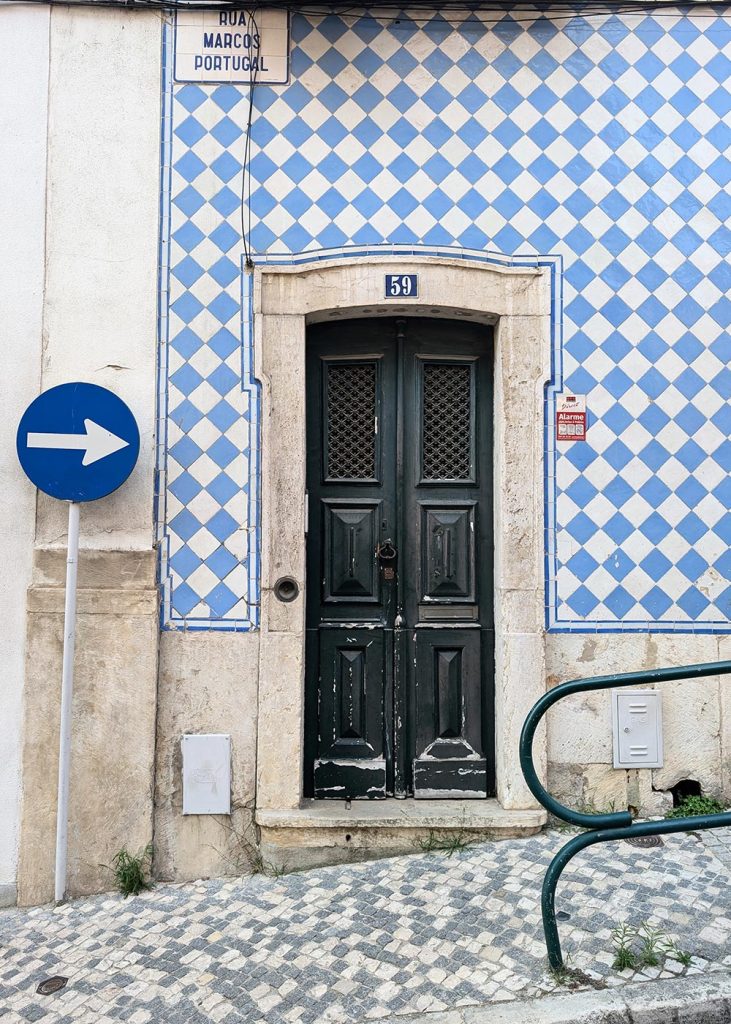
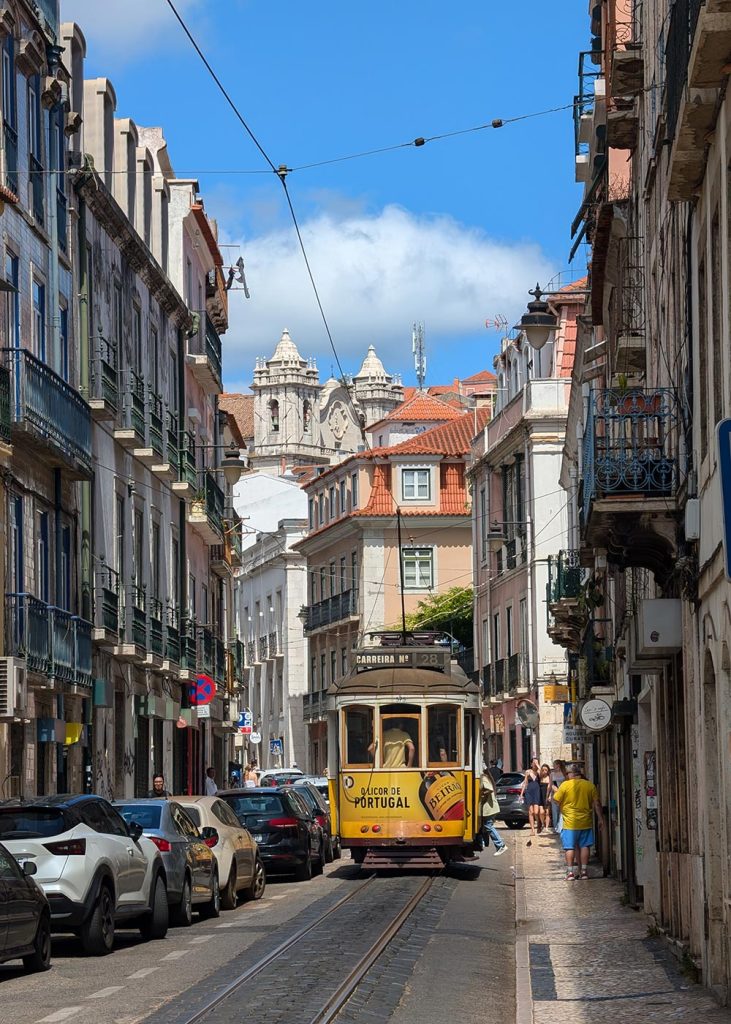
If you’ve seen the pretty cobblestone footpaths of Portugal – known as calçada – then you may understand why you’ll need good walking shoes and nothing else. In the city centre, these well-worn white stones become smooth and very slippery – only made worse if there is actual rain.
I moved here with heels in my suitcase that are still gathering dust to this day. Bring good walking shoes – sneakers, boots or sandals with grip – and forget the rest. Even the capital, Lisbon, is fairly casual for a night out, but if you do want to dress up – opt for ballet flats, take a taxi and avoid walking any hills.
Read next… 24 Best Portuguese Sneaker Brands
Mistake #5: Speaking Spanish
Olá sounds like hola, but Portuguese and Spanish are two different languages. I’m sure you know that, but what you don’t know is the depths of Portuguese culture. Portugal may be a small country with just 10 million people but Portuguese is generally considered to be somewhere between the sixth and eighth most spoken language in the world.
Locals learn English throughout their schooling years, and only children’s shows are dubbed into Portuguese. That’s right, Portuguese adults watch all the American sit-coms in the original language, unlike their neighbours – the Spaniards.
So, if you can’t communicate in Portuguese but you know some Spanish… definitely stick to English. Most Portuguese will be kind about it, but you will most likely offend them by speaking Spanish over English. I find the level of English in the population here is at most half a step behind the Scandinavian nations and the Netherlands.
Tip: Learn some basic Portuguese phrases!
Olá = Hello (quite informal, so the below options are more used)
Bom dia = Good morning
Boa tarde = Good afternoon
Boa noite = Good night
Tudo bem? = How are you doing? (All good?)
Adeus = Goodbye
Tchau tchau = Ciao! Bye!
Desculpe = Pardon me, Sorry
Por Favor = Please
De nada = You’re welcome
Obrigado/obrigada = Thank you (males says orbrigado, females say obrigada)
Água = water
um café = a coffee/espresso
vinho = wine
cerveja = beer
Casa de banho = bathroom
A conta, por favor = the bill/cheque please
Quanto custa? = How much? (good at the flea market!)
Sim = Yes
Não = No
Fala inglês? = Do you speak English?
If you’re somewhere rural or dealing with the older generation, of course do what you need to do. People 60+ more likely learnt French in school, and most Portuguese can understand Spanish in a pickle – though they’ll reply in varying degrees of “Portuñol”.
Read next… A strange whistle in the street? That’s Portugal’s travelling knife-sharpener – the amolador
Mistake #6: Tipping like an American
Tipping is a double-edged sword here. The locals don’t want the intensity and negatives that come with US tipping culture, yet anyone working in hospitality on minimum wage is very grateful for small tips.
It’s not necessary to tip in Portuguese restaurants, but it is polite to leave something. Many locals will simply round up the bill when paying, or leave loose change on the table. That said, in more touristic restaurants, leaving a tip can be expected – usually 10% at most.
Personally, I’ll round up or leave extra change in restaurants, cafes, bars, and with taxis. I’ll make sure to add €1 tip with my rideshares (Uber or Bolt) too. I know most people working these jobs likely earn minimum wages.
In 2025 the minimum wage is €12,180 per year and a surprisingly large portion of the population earns this (or fractionally more). They get paid 14x per year, so you might see the minimum wage figure reported at €870 per month, but it’s more like €1,015 if you split it over 12 months (but that’s still before tax…).
If those people live in Lisbon, right now a bedroom in a sharehouse goes for around €500+, a one-bed flat is €1000+. Sounds tough? It is. So if you have the means, leave your waiter money for a couple of beers or lunch. They will genuinely appreciate it.
➼ Wish someone could shortcut your Portugal research? ➼ Talk to me – I offer 1:1 video calls to help people cut through the noise and plan their perfect Portugal itinerary. Find out more here.
Mistake #7: Paying for free views

In Lisbon there’s a famous landmark, the historic Elevador de Santa Justa. On any day queues snake around the block with people waiting to catch the ancient elevator. It’s a ticketed experience, which I realise does come free with the Hop-On, Hop-Off bus or the Lisboa Card – but I certainly wouldn’t wait an hour whether I had to pay €6 or not to get to the top.
At the top of the staircase near the elevator there’s a foyer that is also a cork souvenir shop, and in here there’s a modern elevator that takes you up to near Igreja do Carmo (Carmo Church). From here you can actually walk out onto the top platform of the historic elevator for free, and enjoy those same views of Lisbon.
Read next… How to spend 48 hours in Lisbon
Mistake #8: Complaining about the graffiti or dirty streets
One of the first things I said in the first week of living in Portugal was: “Lisbon could really use a good pressure wash”.
My partner quickly corrected me. We’d just been in Prague and we felt the city centre had been done up too much for tourism that it felt like a Disneyland city crafted for visitors. I don’t want Lisbon – or Portugal – to be like that.
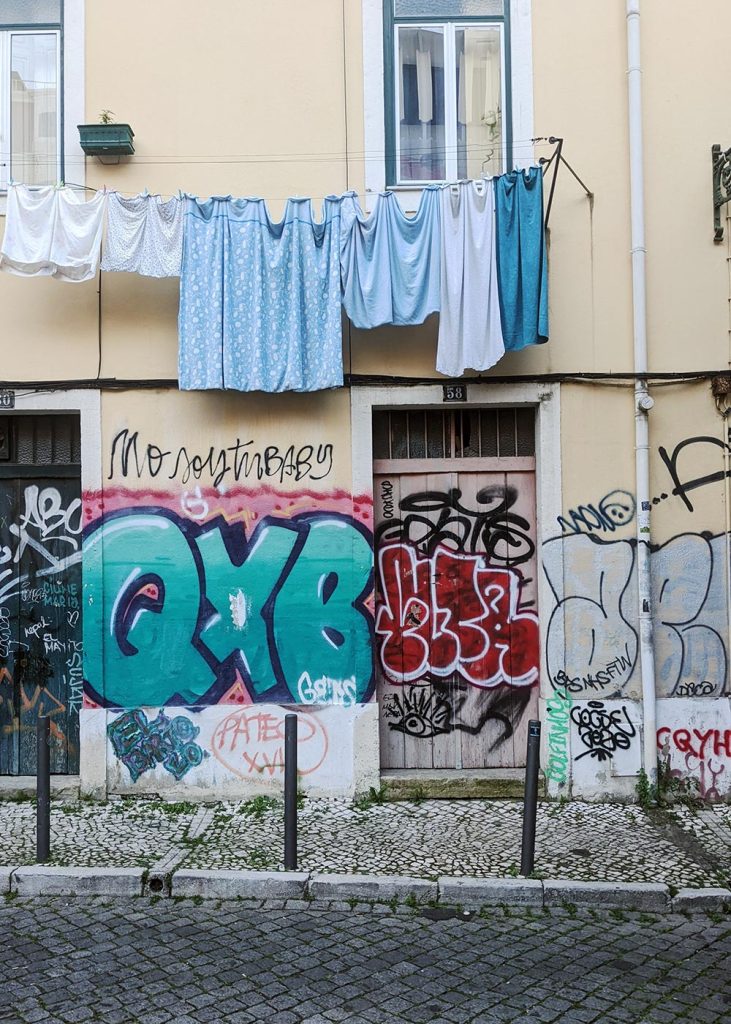
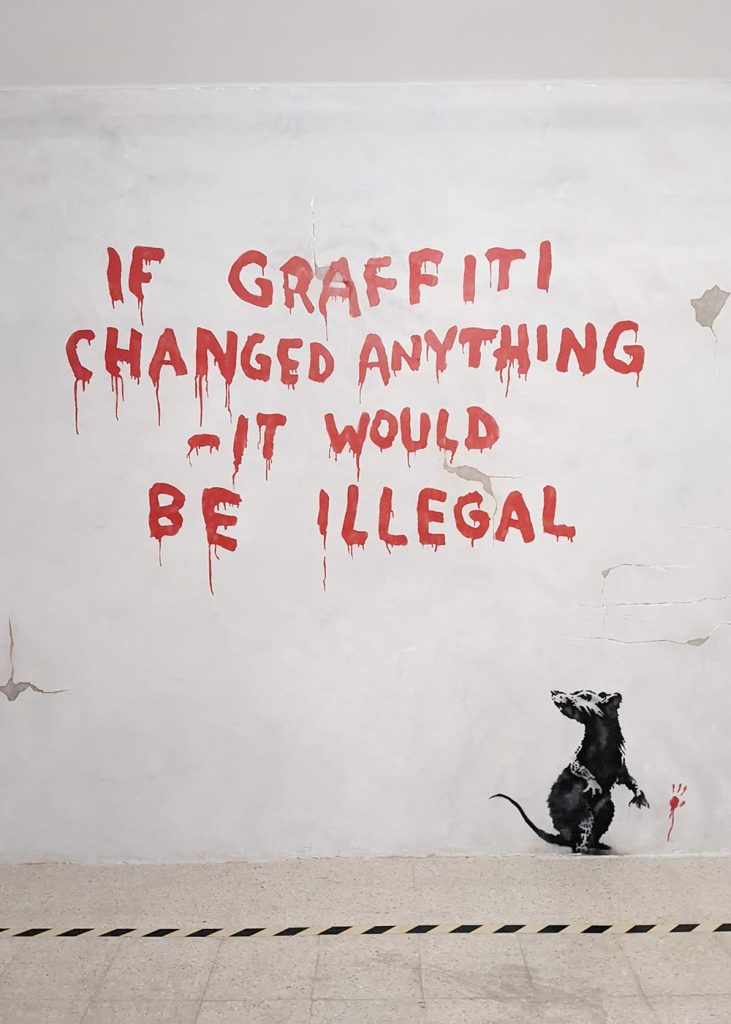
It’s in Portugal that you can dine at relaxed restaurants open for 50 or more years. Safe to say they aren’t repainting the place every few years, and it’s time itself that adds to the charm.
Lately I’ve been feeling the pace of tourism bulldoze some of the charm that made me fall in love with Lisbon in the first place. This city is not perfect, but at least it’s real.
And on the other hand, I’ve noticed some of the touristic neighbourhoods are filthy compared to my more residential inner-city neighbourhood. Locals drink coffee at the bakery or café, not in takeaway cups like visitors often enjoy. Tourists create more rubbish and perhaps don’t have the care to dispose of litter properly.
Read next… 18 best places to visit in the Alentejo: prettiest villages, towns and cities
Mistake #9: Eating at restaurants with photos or too many languages
I’ve put it at number nine, but any regular readers here know food is at the centre of my heart. In any city in Europe – or across the world – eating at restaurants with huge pictures of the food is usually a bad sign.
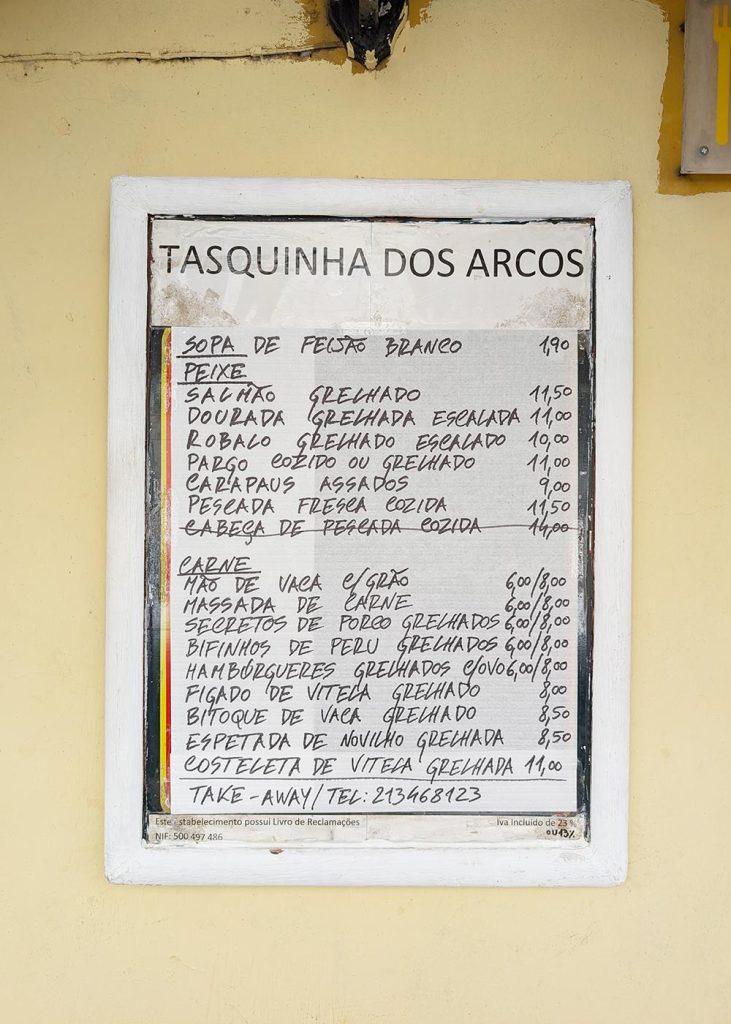

If you want to eat real, authentic Portuguese cuisine where the locals go look for:
- Interiors that haven’t been updated in at least 40 years. Think steel countertops and retro tiles.
- Paper tablecloths. These are essential.
- Bonus points for a paper tablecloth taped to the outside of the restaurant scrawled with the pratos do dia (plates of the day).
- TV in one corner with news or sport. It’s not unusual to see people dining solo.
- Interiors that reflect the terra (land) or local sports clubs. Think old agricultural equipment or scarves and jerseys from Benfica or Sporting or Porto.
- The couvert: The waiter will drop olives, bread and little packets of butter and sardine patée on the table when you arrive.
- House wine comes from a box, but it’s better than you’d expect.
- Specials on certain days of the week. For example, some do cozido à portuguesa every Wednesday.
- Desserts on display. You should be able to wander over and see the house-made desserts. Bonus points for a retro mirrored cabinet.
Note: Many traditional spots now have a menu in English, so don’t consider that too much of a turn off. French would be the next most popular language, so if you’ve read about the spot it’s fine. I’d start thinking twice if you start seeing Spanish, German, Chinese etc. But at really local spots it will be hand-written and all in Portuguese, so just get out your phone and use Google images to decipher the menu.
Tip for finding restaurants on Google Maps: Careful when judging restaurants on Google Maps. Portuguese locals leave a lot of Google reviews, and I’ve found good Portuguese restaurants will only have a rating between 4.0-4.4 on Google Maps – while anything modern and mediocre, fusion or exotic will likely have a 4.7. Consider this when choosing where to eat dinner! Or use my tried-and-tested food guides – I write them for any Portuguese city I’ve spent enough time in.
Mistake #10: Leaving bags visible in your rental car

Portugal has very low crime rates. It’s a really peaceful, safe country to visit. Of course, if you’re on the tourist trail, visiting major landmarks and moving through busy areas, you need to be mindful of pick pockets – though I’ve heard no personal stories of theft here.
What I have heard more about (in Facebook groups) is car break-ins. This will happen when you’re somewhere more remote but touristic. It’s a crime of opportunity – so if you’re clearly driving a rental car and there is a bag or large item on the back seat, then one may assume your trunk/boot is filled with luggage.
I’ve heard that you should scratch the rental car company sticker off the back window, leave nothing (nothing!) on the backseat, and, of course, take anything valuable with you.
Tip: Don’t hire a rental car while in Lisbon or Porto. It’s hard to drive in the city, it can be tricky to park, and the public transport is good and Uber/Bolt is cheap. And for American readers, note that cars are smaller in Europe so you might need a larger class size when booking your car.
Read next… 6 best food markets in Portugal
Mistake #11: Thinking you’re being sold drugs – it’s a seasoning scam
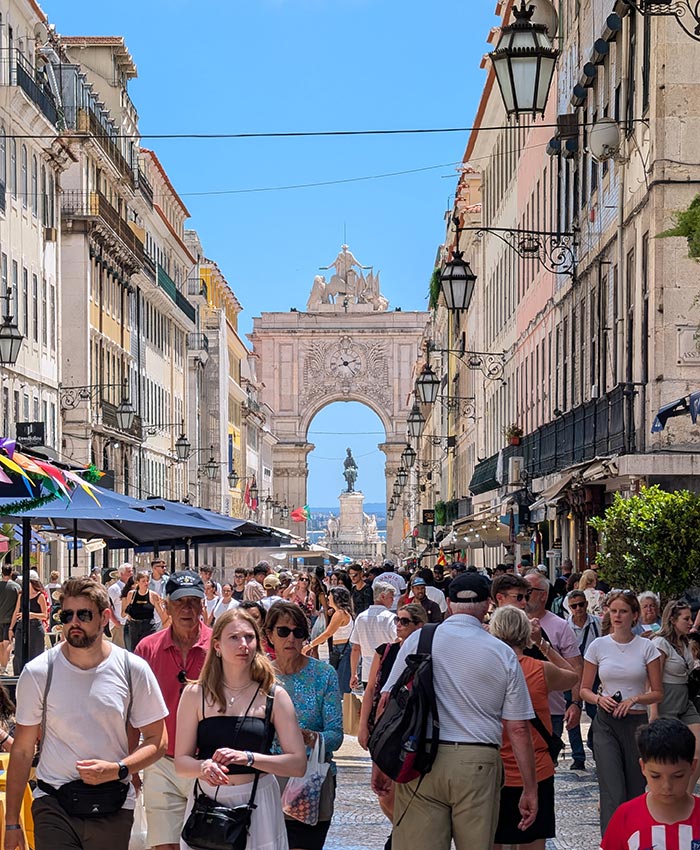
Portugal decriminalised personal drug use years ago, and this action put it in the global spotlight for treating drug addiction like a health problem instead of treating users like criminals.
But you cannot legally deal or sell drugs. So if anyone comes up to you openly on the street and whispers “hashish, marijuana, cocaine…” they are not selling drugs. They’re selling crushed-up cooking herbs and baking powder. You can buy those cheaper at the supermarket 😉
Mistake #12: Trying to see and do much
Calma, calma…you’re in Portugal, the land of pasteis de nata and two-hour wine-fuelled lunches. So, what’s the rush? One major mistake I see travellers make when visiting Portugal is trying to do too much with the time they have available.
Once they land they quickly realise this small country has so much to do and see, and by travelling fast or only visiting Lisbon-Porto-Algarve they’re skipping the essence of the country.
Beyond seeing the sights, Portugal can teach you to slow down, breathe deep, and appreciate the small things in life. if you move too fast, you’ll miss this life lesson. There’s no better – or more local – way to spend an afternoon than sitting on an esplanada (terrace) drinking imperiais or finos (little beers) and watching the world go by.
Of course, everyone has a different travel style, energy, and amount of annual leave – BUT if I had a week in Portugal, I would choose just two destinations or cities. Add 2-4 days for every extra region (at least!). Speaking of destinations…
➼ Wish someone could shortcut your Portugal research? ➼ Talk to me – I offer 1:1 video calls to help people cut through the noise and plan their perfect Portugal itinerary. Find out more here.
Mistake #13: Hesitating at pedestrian crossings
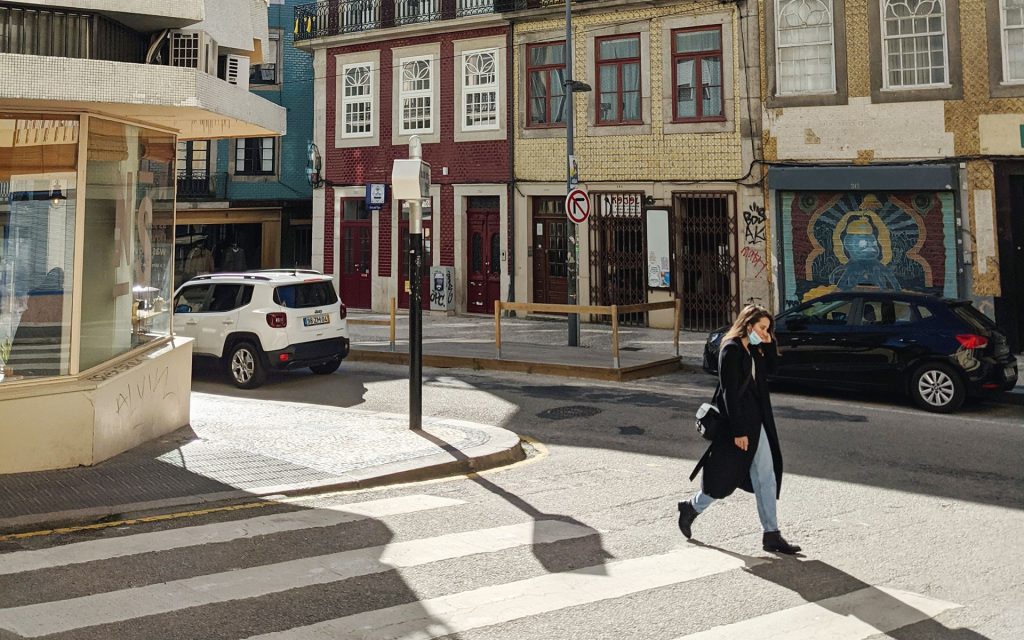
Number one road rule here? Pedestrians are king. Unless there’s a traffic light, the white zebra crossings WILL be treated with utmost respect by drivers. If a pedestrian is ready to cross… just hovers a foot… or even glances – cars will come to an immediate stop.
Tourists and visitors to Portugal ruin the flow. In my neighbourhood there’s a nice symbiosis between pedestrians and cars. When I head downtown I find chaos – if you stop for the cars, then the cars stop for you and the flow is ruined.
While I wouldn’t recommend the kamikaze approach of some Portuguese I see crossing overly confidently while looking down at their phones, headphones in. You want to check that you won’t be run down, but cross with the CONFIDENCE that you are king of the road.
On the odd occasions where cars have braked too slowly, I’ve had the driver stop, wind down the window and apologise for sloppy driver behaviour. Just don’t expect them to indicate or not tailgate.…
The other (semi) unwritten social rule in Portugal is on the bus. Local generally don’t sit in the seats marked for seniors, disabled people or pregnant women. I often see tourists unknowingly break this rule, so just be mindful!
Mistake #14: Only visiting Lisbon, Porto and Algarve
Portugal is a small country, but one that is packed with beauty and beaches, castle and culture, food and so much wine. If you arrive here for a mad fast-paced dash across the country you’ll miss out the gems – the small villages, the long-standing traditions, the chance to connect with the locals.
I understand the pull to see these top-level places, but taking Lisbon as an example – you could spend a few days exploring the capital, add in a couple of day trips to Sintra and Arrábida Natural Park, and maybe dahs out to Évora for an overnight stay. Boom, there’s a week filled with Portuguese culture, history, beaches, wine, long seafood lunches, off-beat adventures, artisans and events.
If you want help designing a Portugal itinerary that goes beyond the basics and takes you that layer deeper, you can chat to me 1-on-1 with a private travel call. I’ve called Portugal home since 2018 and can suggest ideas tailored to you.
Read next… 18 best places to visit in the Alentejo: prettiest villages, towns and cities
Any other mistakes you’d like to add to this article? Leave me a comment…
Keep reading….

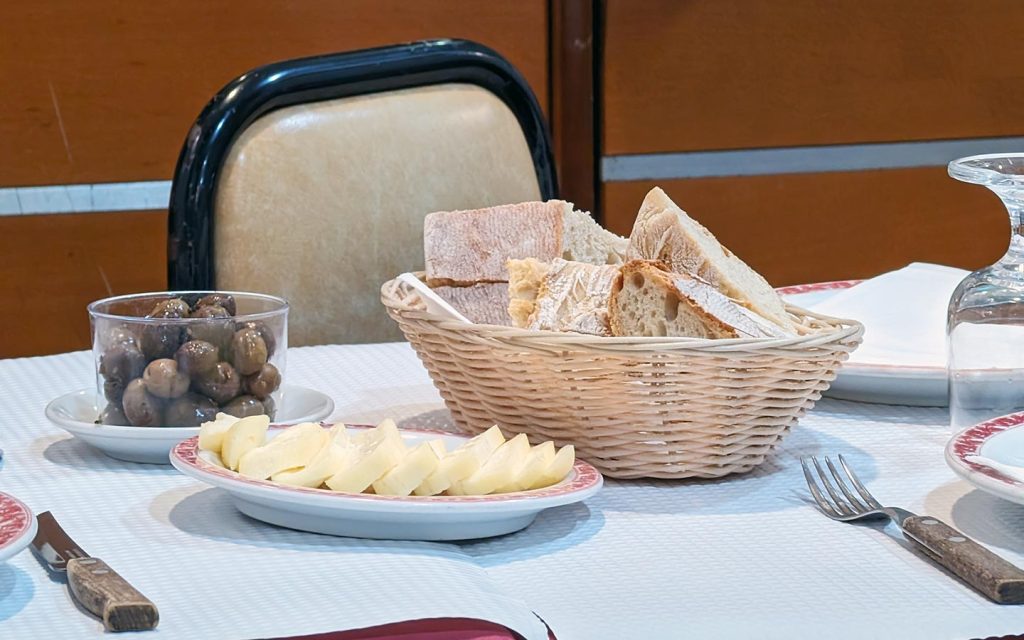
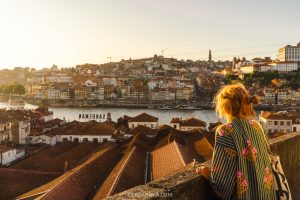

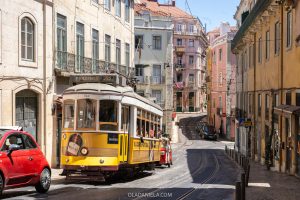







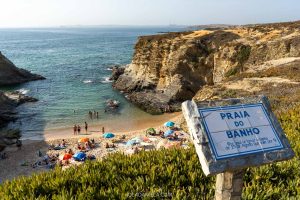

2 Responses
Hello Daniela
I am a Daniela as well..from Tampa Florida
Loved the info you posted
I am looking to spend 2 months in Lisbon/ Sintra area next year…possibly living there part time
Fell on love with Pirtugal
Any suggestions about how to meet people..make new friends ?
Hello Daniela! So nice to receive your comment and glad you’re enjoying my site! It’s quite easy to make friends here – there is a growing international community as well as locals who are very open and welcoming. I would suggest looking for Facebook groups and on “Meet-Up”. There’s often social events, community 5k runs, workshops etc where you can meet people that align with your interests. You have to be proactive, but it’s not too hard!